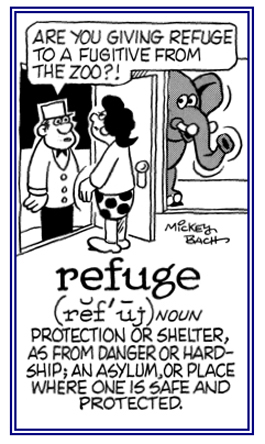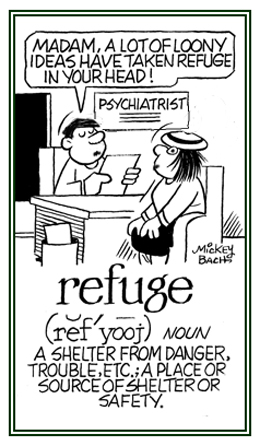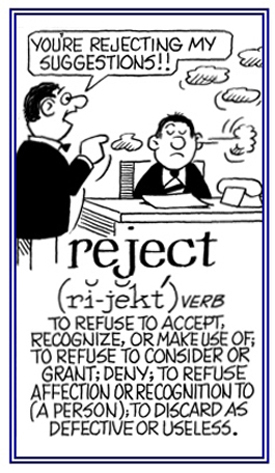re-, red-
(Latin: back, backward, again; used as a prefix)
A cabinet or room for storing substances, as food, at a low temperature: Lisa had a very big refrigerator in her kitchen which also had a freer sectuib with two large drawers.
1. A shelter or place of protection from physical danger or weather: While hiking, a thunderstorm suddenly started up and the two girls had to find a refuge in order to protect themselves from the bad rain.
2. Something that offers or appears to offer shielding and safety: When Jim's life became unbearable after losing his job, he and his wife found refuge with her parents who were able to give them some financial support.

© ALL rights are reserved.

© ALL rights are reserved.
Go to this Word A Day Revisited Index
2. Something that offers or appears to offer shielding and safety: When Jim's life became unbearable after losing his job, he and his wife found refuge with her parents who were able to give them some financial support.


Go to this Word A Day Revisited Index
so you can see more of Mickey Bach's cartoons.
A person, or people, who flee for shelter or safety; especially, to a foreign country, as in a time of political upheaval, war, etc.: The recent military conflicts in Syria have resulted in thousands of refugees seeking shelter in other countries.
refuse (verb), refuses; refused; refusing
1. To declare a decision or intention not to do something.
2. To decline to accept something offered; for example, the man refused the alcoholic drink.
3. To be unwilling to give, allow, or to agree to something asked for by somebody: "I refused to listen to the man as he complained on and on."
4. Etymology: from Old French refuser which came from Latin refusare, refundere "to pour back, to give back".
2. To decline to accept something offered; for example, the man refused the alcoholic drink.
3. To be unwilling to give, allow, or to agree to something asked for by somebody: "I refused to listen to the man as he complained on and on."
4. Etymology: from Old French refuser which came from Latin refusare, refundere "to pour back, to give back".
refute (verb), refutes; refuted; refuting
1. To prove the incorrectness or falsity of a statement or idea: The lawyer, Mr. Webster, refuted the testimony of the witness against his client, Tim Smith, as being completely untrue.
Greg's employer totally refutes the allegation that he is racially biased.
2. To say that something is neither true nor accurate; to challenge or to contradict: Mike is refuting the notion that he is planning to retire soon.Shirley refuted the allegations that since she got such a high score that she had cheated on her final exam.
3. Etymology: "refuse, reject", from Latin refutare, "to drive back, to repress, to repel, to rebut"; re-, "back" + -futare, "to beat, to strike down".
regard (verb), regards; regarded; regarding
1. To look at closely; to observe carefully: Jack, the passenger in the car, said, "Jim, please regard the speed limit by paying attention when you are driving your car!"
2. To identify or to view in a particular manner: Harry's behavior was regarded as foolish.
3. To value, to esteem, or to like: Mr. Scott's students regard him as one of their best teachers.
4. To see, to reckon, and to consider: People regarded Kerri's laughter at the funeral as inappropriate.
5. To have good wishes expressed for others: Shanna regards Eugene's best wishes as a sincere gesture.
6. Etymology: from Old French regard, from regarder, "to take notice of"; from re-, "back" + garder, "look, heed, guard".
2. To identify or to view in a particular manner: Harry's behavior was regarded as foolish.
3. To value, to esteem, or to like: Mr. Scott's students regard him as one of their best teachers.
4. To see, to reckon, and to consider: People regarded Kerri's laughter at the funeral as inappropriate.
5. To have good wishes expressed for others: Shanna regards Eugene's best wishes as a sincere gesture.
6. Etymology: from Old French regard, from regarder, "to take notice of"; from re-, "back" + garder, "look, heed, guard".
regenerate
regress
The process by which an individual changes his or her behavior, thoughts, or language from a previous state of development to something not as mature: Due to the frightening trauma experienced by Leslie as a teen and subsequent regressions while she was talking, her verbal expressions made her sound much younger and frail.
reject (verb), rejects; rejected, rejecting
1. To refuse to agree to, believe in, or make use of something: The Jones family rejected the salesman's suggestion that they replace their old vacuum cleaner because it was still doing what they needed to have done.
2. To decide not to give a person something asked or applied for: When Joseph tried to get a job with the car company, he was rejected because he didn't have the experience that was necessary for the position.
3. To decline a proposal or to turn someone down: Shirley rejected Tom's offer of marriage because they only knew each other for a very short time and she was not ready to commit herself until she knew him better.

© ALL rights are reserved.
Go to this Word A Day Revisited Index
2. To decide not to give a person something asked or applied for: When Joseph tried to get a job with the car company, he was rejected because he didn't have the experience that was necessary for the position.
3. To decline a proposal or to turn someone down: Shirley rejected Tom's offer of marriage because they only knew each other for a very short time and she was not ready to commit herself until she knew him better.

Go to this Word A Day Revisited Index
so you can see more of Mickey Bach's cartoons.
rejection
rejoin (verb), rejoins; rejoined; rejoining
1. To say in reply, especially in sharp response to a reply.
2. To come again into the company of a person, a group, an organization, etc. 3. To join together again; to reunite, to meet up again with someone, or to go back to someone or something, usually after a brief period of being away or separated.
4. To join two things together again, or to become joined together or merged with something again.
2. To come again into the company of a person, a group, an organization, etc. 3. To join together again; to reunite, to meet up again with someone, or to go back to someone or something, usually after a brief period of being away or separated.
4. To join two things together again, or to become joined together or merged with something again.
rejuvenate
1. To make someone become, feel, or appear to be young again.
2. To restore something to its condition when it was new, or to make it more vigorous, dynamic, and effective.
3. To restore to a former state; to make fresh or new again: "He was able to rejuvenate our old dining room table."
2. To restore something to its condition when it was new, or to make it more vigorous, dynamic, and effective.
3. To restore to a former state; to make fresh or new again: "He was able to rejuvenate our old dining room table."
rejuvenation
1. The act of restoring to a more youthful condition.
2. The phenomenon of vitality and freshness being restored to a person, a situation, or condition.
2. The phenomenon of vitality and freshness being restored to a person, a situation, or condition.
rejuvenator
1. Someone who aids people or things back to a youthful condition or to a prior normal situation.
2. Anyone who restores to a former more youthful state or makes (someone or something) fresh or new again.
2. Anyone who restores to a former more youthful state or makes (someone or something) fresh or new again.


